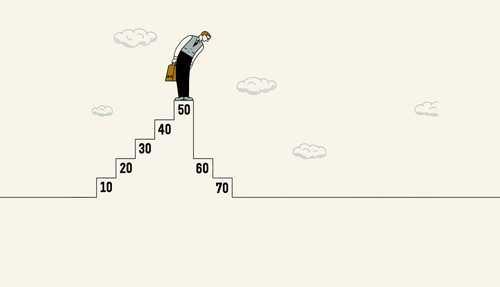Your Professional Decline Is Coming (Much) Sooner Than You Think
Curated from: theatlantic.com
Ideas, facts & insights covering these topics:
9 ideas
·6.64K reads
6
Explore the World's Best Ideas
Join today and uncover 100+ curated journeys from 50+ topics. Unlock access to our mobile app with extensive features.
Well-being of adults
- Studies show that most adults' happiness declines through their 30s and 40s, then hit a low in their early 50s.
- After that, studies show that, in wealthier countries, most people's contentment starts to increase again in their 50s, until about age 70.
- After 70, some people stay happy, while others get happier until death.
- Men, in particular, see their happiness decrease after age 75.
- Researchers set out to find what drives the unhappiness of people after age 75. In short, it is irrelevance.
- Senior citizens who seldom feel useful are nearly three times as likely as those who frequently feel useful to develop a mild disability.
162
1.36K reads
The memory of past success
Current achievements provide happiness, but the memory of past accomplishments do not appear to produce long-lasting happiness.
The waning of ability in people of high accomplishment is particularly difficult psychologically. Retired athletes struggle profoundly after their sports career ends. They are prone to depression, addiction, or suicide.
154
993 reads
"Unhappy is he who depends on success to be happy. For such a person, the end of a successful career is the end of the line. His destiny is to die of bitterness or to search for more success in other careers and to go on living from success to success until he falls dead. In this case, there will not be life after success."
ALEX DIAS RIBEIRO
207
774 reads
The principle of Psychoprofessional Gravitation
It is the idea that if you reach professional heights and are deeply invested in being high up, you can suffer greatly when you inevitably decline.
In many professions, we may reject the inevitability of decline before a very old age. But the data are clear that for most people, in most fields, decline starts earlier than expected. According to research, success and productivity increase for the first 20 years after the inception of a career. If you start a career at 30, your best work will be produced around 50, and decline after that.
144
611 reads
How to deal with a professional decline
Some people have managed their declines well.
When the musical career of Johann Sebastian Bach declined, instead of becoming depressed or discouraged, he chose to redesign his life, moving from composer to instructor. In his later years, he lived a quieter life as a teacher and family man.
142
654 reads
Fluid and crystallized intelligence
- Fluid intelligence is the ability to reason, analyze, and solve unique problems. It is highest in early adulthood and diminishes in one's 30s and 40s.
- Crystallized intelligence is the ability to use knowledge gained in the past. It relies on accumulated knowledge, tends to increase through one's 40s, and does not diminish until very late in life.
Careers that rely on fluid intelligence tend to peak early, while those that use more crystallized intelligence peak later. Profound insights tend to come from those in their 30s and early 40s. The best explainers of complicated ideas tend to be in their mid-60s unto well into their 80s.
171
608 reads
The reverse bucket list
Many wealthy people keep on working to increase their wealth far beyond what they could possibly spend. They often do it because they get a sense of self-worth from it. However, focusing on acquisition leads to attachment and vanity, which derails the search for happiness.
Instead of acquiring more, we should strip things away. Our lives are not a canvas to fill, but more like a block of marble to chip away and shape something out of. Each year's goal should be to throw out things and obligations until a refined self is revealed.
190
574 reads
The two kinds of virtues
There are two kinds of virtues:
- Résumé virtues. These are professional and geared toward worldly success.
- Eulogy virtues. These are ethical and spiritual. They are what you want people to talk about at your funeral. "He was kind and deeply spiritual," not "He made senior vice president and had a lot of frequent-flier miles."
We live a most fulfilling life, especially when we reach midlife, by pursuing virtues that are meaningful to us.
178
505 reads
A guide for the remainder of your life
Acceptance of the natural cadence of our abilities allows the shifting of attention to higher spiritual and life priorities.
- Jump: Let go when you have reached your peak accomplishment, perhaps before you are completely ready. You don't necessarily have to quit your job, but be content to walk into the next stage of life.
- Serve: Move from activities focused on the self to activities focused on others. Focus on teaching or mentorship, sharing ideas in the service of others.
- Worship: Bach said that "the aim and final end... should be none other than the glory of God and the refreshment of the soul." Whatever your metaphysical convictions, refreshment of the soul can be the aim of your work.
- Connect: Happiness is directly tied to one's relationships. Dedicate more time to relationships, and less to work.
172
556 reads
IDEAS CURATED BY
Adeeb Schultz's ideas are part of this journey:
Learn more about personaldevelopment with this collection
Navigating and enjoying the thrill of horror and scare experiences
Historical knowledge of Halloween and its origins
Understanding and appreciating Halloween traditions worldwide
Related collections
Similar ideas
5 ideas
4 ideas
Opinion | Are You Listening?
nytimes.com
Read & Learn
20x Faster
without
deepstash
with
deepstash
with
deepstash
Personalized microlearning
—
100+ Learning Journeys
—
Access to 200,000+ ideas
—
Access to the mobile app
—
Unlimited idea saving
—
—
Unlimited history
—
—
Unlimited listening to ideas
—
—
Downloading & offline access
—
—
Supercharge your mind with one idea per day
Enter your email and spend 1 minute every day to learn something new.
I agree to receive email updates

